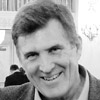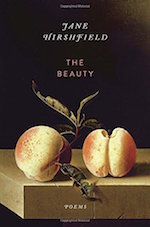Her new collection, The Beauty, pursues these questions or simply depicts them en parade. The poems marshal images and propositions alike. They can be swift and stony, laconic or anaphoristic. Sometimes broken causal chains are synthesized in Zen-like bursts of subject-changing. Sometimes they are left hanging—as are we. There is a lot of dynamism here that doesn't come courtesy of the usual energy packs—about which more in a minute. Take this:
x, says the blue whale
x, say the krill
solve for y, says the ocean, then multiply by existence
—"Mosquito"
In turning away from solving logical puzzles by parodying them, Hirschfeld concedes the justice of moments when things in the world at large appear to be distinctly awry. It's not just that things do not hang together—that would be the field of the tragic. It's that sometimes they hang together too much, and language can only point out the fact by putting on its conical hat and embracing the absurd as our sense. At the terminus of absurdity, of course, the spirit lies in wait, and Hirshfield's poems, for all their emphasis on Ceci n'est pas une pipe, are documents of spiritual expression and moment, even of longing.
The poems in The Beauty are typically short, with abrupt rhythms, almost always preferring a staccato to legato. Lineation, as a matter of scansion, is not a thing here. The rabbit-tacking of thought clothed in phraseology is.
Chthonic corkboard,
always beneath
even when hung on your vertical side,
your waiting thumbtacks
seem to me
a glittering affection,
the mi casa, su casa
of a door standing open in every weather
of invitation.
—"My Corkboard"
Indeed, a number of the short imagistic and irony-tinged poems tip the hat to taciturn masters like Basho. Musicality of course, in its arabesques, aims to endorse harmony, even as it contains and enables dissonance. Hirshfield's poems prefer the eye to the ear, and from the eye, they proceed immediately to the central processor. The question will become whether that processor is the heart or the head.
I hear echoes of poets as various as Yehuda Amichai and Naomi Shihab Nye in her work. There are also accents of sudamericanos, eastern-European surrealists, assorted Poundians, and imagistes:
Music comes with instructions:
pianissimo, forte.
In Nō plays the actors wear masks,
so their souls can be seen:
wild-haired old woman, callow young priest.
Each morning I wake in strange country,
my bed made of strange wood.
Time arrives clockless.
Rain poses hieroglyphic, with bent knees,
shoulders askew, arms lifting
from out of the future
the future—
a box labeled neither
"Requests" nor "Suggestions."
— "Honey"
One thing that Hirshfield likes to do, I am pleased to see, is to refresh the ordinary. Not that the ordinary sits like an idle milk carton or needs our use to invest it in meaning. Still, it's an honorable tradition, and her work hews to it closely. Take this, for example:
and yet a chair in snow is always sad
more than a bed
more than a hat or house
a chair is shaped for just one thing
to hold
a soul its quick and few bendable
hours
perhaps a king
— "A Chair in Snow"
Someone once asked Modigliani why he painted so many nudes. His reply, "So I can find my way around" was only partly in earthy jest. The spadework of description yields not just freshness and clarity, it also has the ability to pitch one toward vision, as Elizabeth Bishop knew and showed. Two related ideas are involved: identity and metaphor. These days both of these ideas have had lots of air time, for identity is related not just to Linnaean sorting and categorizing (though there is that), but brings us before the most elemental questions of our being: what does it meant to be a thing and to have meaning? What is authenticity? Is there anything to the concept of integrity that is not better conceptualized by a "construction"? What is the status of identity in the long haul? Hirshfield's poems touch, in their way, on each of these questions, and this gives them a weight that is belied by their brevity. Often, that brevity takes the form of the proposition. In the
course of that, they run into a problem that's inherent in metaphor language—the patois of poets—which is the fact that to say a thing is something else is all by itself
a contradiction. And yet, one can see the benefit: if a thing is (also—or really)
something that it is not, might we not say rather that the world stands to inherit the calming, familial symmetry George Herbert wrote about, in which "head with foot hath private amity,/ And both with moons and tides"? At the same time, such a symmetry counters the rude sense of contradiction that is the other face of metaphor, in which there is nothing that we are, other than what we are. Both of these senses combine to mark the field for subjectivity, the most fundamental field for poetry. And what more fundamental expression for our subjectivity, whether vexed as a shell game or secure as a vault, than the pronoun?
Ninety percent of my cells, they have discovered,
are not my own person,
they are other beings inside me.
As ninety-six percent of my life is not my life.
Yet I, they say, am they—
my bacteria and yeasts,
my father and mother,
grandparents, lovers,
my drivers talking on cell phones,
my subways and bridges,
my thieves, my police
who chase my self night and day.
— "My Proteins"
Here is another example, taken more or less at random, as they are numerous in the work:
I say I
&
a small mosquito drinks from my tongue
but many say we and hear I
say you or he and
hear I
what can we do with this problem
a bowl held in both hands
cannot be filled by its holder
— "Mosquito"
In "Perspective: An Assay" the question of identity comes back via another way:
In this Chinese scroll, for instance, unrolling as if without limit
its small boat, downrushing river, and strolling deep-sleeved officials
in oddly shaped caps,
the curious horse looking out
from behind the long-needled pine it's been momentarily tied to forever.
So many of the poems are definition poems that proceed by way of situating the eye in a field of images, as if images are candidates waiting for a try. This above is a good example. Question is, what's the difference between a poem of identity and a poem of definition? Robert Pinsky is another poet for whom description takes on the cerements of deep, final-vocabulary identity. Both poets travel a path made visible by Neruda's Odes Elemantales, where the ordinary, thanks to the dogged spadework of the poet, is forced to give up its protective coloration and declare itself as singular. Francis Ponge was another. Blake's whole aesthetic was based on just such digging to uncover an essence. Unfortunately, we live in times inimical to essences. No worries, says the poet: essences, as Hopkins know, are all "momentarily tied to forever."
Such questions become spiritual the moment the question of identity arises, for in essences, whatever else they do, also ask whether there is some sense in which we fit into the scheme of creation, or are we rather renegades in our dreams, even—or especially—in our poetry. These are dark thoughts, not alleviated by melodic caresses. In some sense, the "spiritual" exists to address and accommodate our feeling, not only that we are cosmically at risk (mortality sees to that already) but that squaring our audacity at owning a sense of subjectivity with having poetry somehow undermines our existential membership. In our behalf, it should be noted that this audacity is also clear-eyed in its self-recognitions and niggling (and nibbling) doubts:
a person misreads
delirium as delphinium
and falls into
a blueness sleepy as
when sneezing
the pronoun dozes
—"Mosquito"
It is usually at this point that someone on the back row points out that the tragic restores our exceptionalism. Hirshfield answer more robustly regarding our empty-handedness before everything that subjectivity isn't. Her answer is that this emptiness is a more capable key, a skeleton key, if you will:
In my hand I carry a card.
Its lines declare I am cardless, carless,
stateless, and have no money.
It is buoyant and edgeless.
It names me one of the Order of All Who Will Die.
— "In My Wallet I Carry a Card"
What is ancient in poetry steps up in despite of smart answers and philosophical conundrums to ask where is the song? Is the poet making a poem from the heart of—if not of the self—the song? That "heart," that special pleading on behalf of the felt takes little cognizance of the intellect's feats and mile-markers, wants to be taken as seriously as the dryness. It's good that she checks in:
There were times my life and I made jokes together.
There were times we made bread.
Once, I grew moody and distant.
I told my life I would like some time,
I would like to try seeing others.
In a week, my empty suitcase and I returned.
I was hungry, then, and my life,
my life, too, was hungry, we could not keep
our hands off our clothes on
our tongues from
— "My Life Was the Size of My Life"
The isness of things, the quiddity, may escape attempts to know, to catalog and arrange, but the fact doesn't remove the poet from the urge to celebrate. The fact is another inroad to the spiritual side of this work: In "I Cast My Hook, I Decide to Make Peace," she asserts,
And so I put peace in a warm place, towel-covered, to proof,
then into an oven. I wait.
Peace is patient and undemanding, it surpasseth.
And the bulldozers move
from the palace of breaking to the places of building.
And the students return to their classes.
Tuna swim freely.
The sky hoists the flag of the sky.
The is the singing at the heart of The Beauty, and it is itself an example of beauty's pied expressiveness as the mundane morphs into the sacred and returns at daybreak to its repose in the common.




